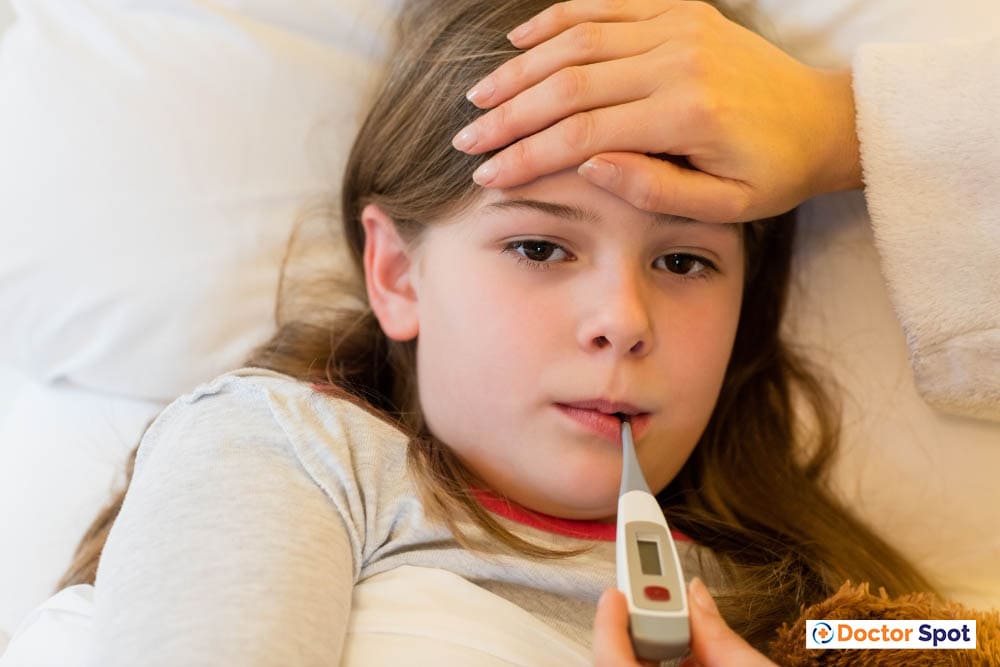Viral Fever – Symptoms, Causes, Treatments, and More

Table of Contents
Introduction
Viral fever isn’t just any fever – it’s like that unexpected guest who overstays their welcome. It’s a temperature rise caused by viral infections and can really throw a wrench into your everyday life. In this guide, we’re diving deep into everything you need to know about viral fever. From spotting the symptoms to the best ways to treat it, it’s all here.
Symptoms of Viral Fever
Common Symptoms
When you’re hit with a viral fever, the first thing you notice is probably the thermometer reading off the charts. But that’s not all. Common symptoms include:
- High body temperature
- Body aches and pains
- Chills and shivering
- Fatigue
- Headaches
Severe Symptoms
Although less common, viral fever can sometimes come with severe symptoms like:
- Persistent high fever (over 103°F)
- Severe headaches
- Breathlessness
- Uncontrollable shaking
- Altered consciousness
Duration of Symptoms
Typically, a viral fever can last anywhere from a few days to a week. However, some persistent strains may drag the symptoms out for a bit longer.
Causes of Viral Fever
Viral Infections
The culprit behind a viral fever is, you guessed it, a virus. They invade your body, triggering an immune response, and your body heats up as it tries to fight off the invader.
Modes of Transmission
- Airborne: Sneezing and coughing
- Direct Contact: Shaking hands or touching infected surfaces
- Ingesting Contaminated Food/Water: Consuming items contaminated with the virus
Risk Factors
Some factors can increase your risk of getting a viral fever:
- Weakened immune system
- Crowded places
- Poor hygiene practices
- Unvaccinated individuals
Diagnosis of Viral Fever
Clinical Examination
Your doctor will start with a physical check-up, looking for telltale signs like a high temperature and swollen lymph nodes.
Diagnostic Tests
Sometimes, a physical check isn’t enough. Blood tests, throat swabs, and imaging tests might be employed to pinpoint the exact viral culprit.
Differential Diagnosis
It’s crucial to differentiate viral fever from bacterial fever. The treatment plan can vary significantly, so getting this right is vital.
Treatment of Viral Fever
Home Remedies
For mild cases:
- Rest: Your body needs time to heal.
- Hydration: Drink plenty of fluids.
- Nutrient-Rich Diet: Think soups and vitamin-packed fruits.
Over-the-Counter Medications
- Antipyretics: Paracetamol or ibuprofen to reduce fever.
- Decongestants: To ease nasal stuffiness.
Professional Medical Treatments
For severe or persistent cases, a doctor might prescribe:
- Antiviral drugs
- Intravenous fluids
- Hospitalization in extreme cases
Prevention of Viral Fever
Hygiene Practices
- Wash your hands regularly.
- Use hand sanitizers.
- Keep your surroundings clean.
Vaccination
Get vaccinated against common viruses like the flu to minimize the risk.
Lifestyle Changes
- Maintain a balanced diet.
- Exercise regularly.
- Get adequate sleep.
When to See a Doctor
Red Flag Symptoms
Seek immediate medical attention if you experience:
- Extremely high fever
- Severe headaches
- Difficulty breathing
- Persistent vomiting
Chronic Cases
If a viral fever persists beyond a week, make sure to consult a healthcare provider.
Complications of Viral Fever
Potential Health Risks
While most viral fevers are benign, they can sometimes lead to complications such as:
- Pneumonia
- Meningitis
- Encephalitis
Long-term Effects
Prolonged viral fevers can sometimes cause long-term fatigue or other lasting health issues.
Viral Fever in Children
Symptoms in Kids
Children might show different symptoms like rashes, irritability, and a reluctance to eat.
Treatment Approaches for Children
Always consult a pediatrician for the appropriate treatment. Never administer medication without professional guidance.
Viral Fever vs. Bacterial Fever
Key Differences
- Viral Fever: Caused by viruses; doesn’t respond to antibiotics.
- Bacterial Fever: Caused by bacteria; can be treated with antibiotics.
Why the Distinction Matters
Treating viral infections with antibiotics can lead to resistance, making bacteria harder to treat in the future.
Living with Viral Fever
Coping Strategies
- Rest
- Light activities
- Staying hydrated
Support Systems
Having family and friends help out can make a world of difference.
Myths and Facts about Viral Fever
Common Misconceptions
- “Only cold weather causes viral fever.” (False)
- “You can’t get a viral fever in summer.” (False)
Evidence-based Information
Proper hygiene and vaccinations are the best defenses against viral fever.
Impact of Viral Fever on Daily Life
Work and School Implications
Staying home from work or school may be necessary to prevent spreading the virus.
Social Considerations
It’s best to limit social interactions to avoid infecting others.
Global Perspective on Viral Fever
Statistics
Viral fevers are among the most common illnesses worldwide, affecting millions annually.
Case Studies
Different regions have unique viral strains and challenges, highlighting the need for localized prevention strategies.
Conclusion
Understanding viral fever is crucial for managing symptoms and reducing transmission. By adhering to preventive measures, seeking timely medical advice, and debunking myths, you can navigate through this illness more effectively.
FAQs
What causes viral fever?
Viral fever is caused by various viruses that invade the body, prompting an immune response which raises body temperature.
How long does viral fever usually last?
It typically lasts between a few days to a week, although some strains may cause symptoms to persist a bit longer.
Can viral fever be prevented?
Yes, with proper hygiene, vaccinations, and a healthy lifestyle, you can minimize the risk of contracting viral fever.
Why is it important to differentiate between viral and bacterial fever?
The treatment for each differs significantly, with bacterial fevers requiring antibiotics and viral fevers primarily needing supportive care.
Are there any long-term effects of viral fever?
While most people recover fully, some may experience prolonged fatigue or other lingering symptoms, especially if complications arise.
Also read: 7 chakras in human body and Their Meanings